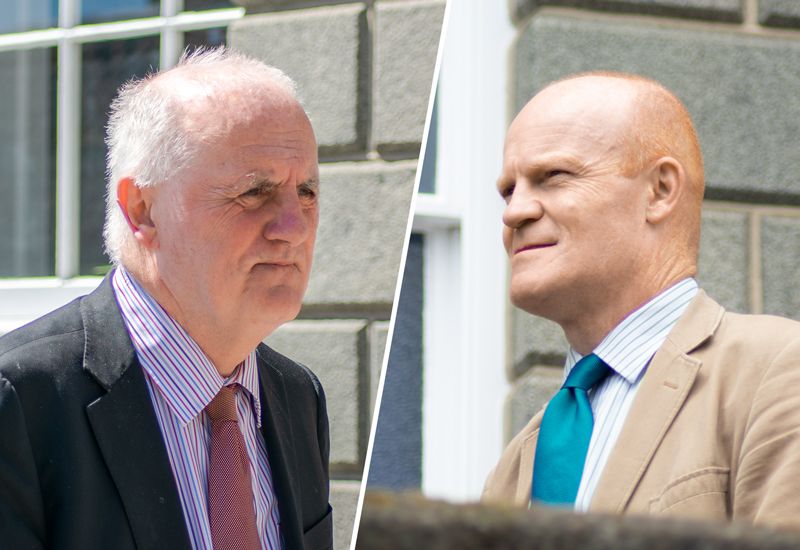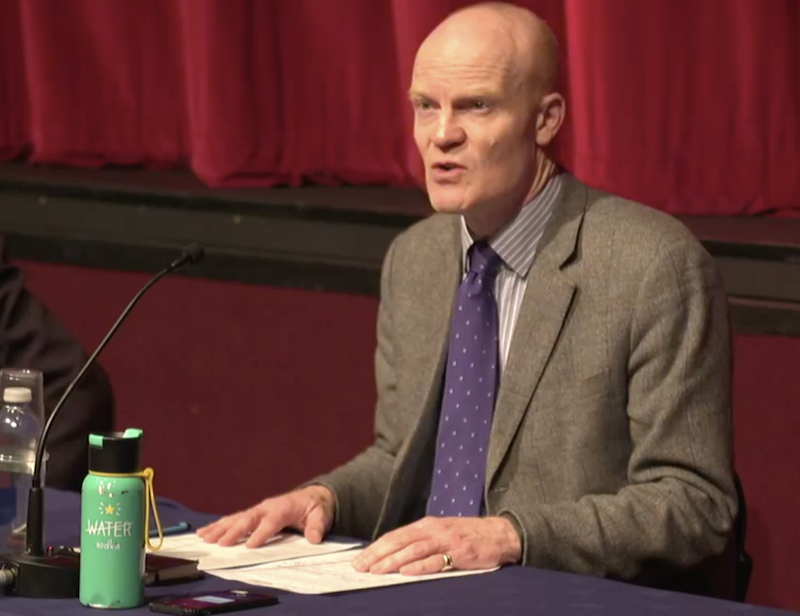


Given the UK's deteriorating position caused by the more transmissible Delta variant of Covid-19, the risks of proceeding with no testing or isolation requirements for some travellers from 1 July are not worth the benefits, according to Deputy Gavin St Pier. The politician who headed up the Civil Contingencies Authority during the first wave of the pandemic has explained why he believes the decision-making body should delay its new 'blue' category for one month in order to avoid making a costly mistake.
"Personally, and selfishly, the new rules on entry to the Bailiwick after 1st July, with no test or isolation for travellers from the Common Travel Area (basically, anywhere in the British Isles), suit me and my fully vaccinated family very nicely. They will enable several family movements that wouldn’t otherwise have been practicable.
Quite early in the pandemic, it was recognised that whilst putting the Bailiwick in lockdown was a momentous decision, it was a relatively simple one compared to the challenges that would be faced with unlocking. And so it has proved. These are hard decisions – I know that - not taken lightly, resting on the shoulders of a handful of individuals.
They are political decisions, albeit well informed by public health, legal and operational advice. Having been one of those decision makers, I’ve understandably been reluctant to comment on decisions taken since I ceased to chair the Civil Contingencies Authority, given also I know that I don’t know what I don’t know in terms of the advice considered.
I know also that the decisions in relation to border arrangements will have been taken after much discussion and challenge by several individuals whom I trust and know to be both thorough and cautious.

Pictured: Deputy Gavin St Pier was the Chief Minister and Civil Contingencies Authority Chairman up until October 2020.
Consequently, I’ve reflected hard before commenting publicly but decided that I do have a few issues of enough concern to speak up. I know that in doing so, my comments will not be welcomed by some elected colleagues, including the decision makers and by some in the community, who are very content with the new arrangements.
Everyone is fed-up with COVID. After 18 months of this virus’ life on earth, understandably, we want normal travelling life to resume. We want to finally be able to see and hug distant family and friends. Businesses want to start travelling again to meet and woo clients and prospects. But I’ve not been elected to either stay silent or seek popularity. My primary current role is to attempt to provide effective scrutiny and ensure accountability.
Given that the Regulations for the new travel regime will not be laid before the States of Deliberation before the regime takes effect, I have no parliamentary route available to me, hence this comment piece.
Following the advent of the Delta variant of the virus in the UK, it has been inevitable for several weeks that the original ambition of a complete lifting of border controls from 1 July was undeliverable. Given this fact, I regret that the CCA did not signal or flag that inevitability much earlier. Many people had understandably built hopes and planned based on the earlier ‘blueprint.’ Expectations could have been better managed with earlier, more nuanced communications.
On 1 July, approximately 56% of over 16’s (circa 47% of total population) having been double vaccinated more than 14 days earlier, will be able to take advantage of the ‘blue channel.’ That number will obviously keep growing after 1 July, but it does mean over 40% of adults will be unable to do so, at least initially. Given the vaccine has been rolled out in age priority, I deeply regret the fact that those that will be ineligible are disproportionately younger islanders, particularly those students seeking to return to the island after, frankly, a miserable academic year. They will now be required to pay, and many will need to self-isolate for up to 14 days, as the UK’s prevalence rate continues to exponentially rise, taking their student cities into current Category 4. This group did us mighty proud at Christmas when they returned with great care and responsibility and this is their repayment? From their perspective, it may feel like they’ve been thrown under the bus with #GuernseyTogether having served its purpose and been replaced by #EveryDoubleVaccinatedPersonForThemselves. Now, I know why this decision has been taken. The Civil Contingencies Authority is under a serious legal obligation to satisfy itself that the restrictions it imposes on the community are ‘proportionate’ to the threat faced. We can therefore conclude that it has decided that it is no longer proportionate to restrict an individual’s right to move freely if they’ve been double vaccinated. But proportionality is a subjective concept, and it would have been an equally valid conclusion that it is proportionate for the community as a whole, to retain more restrictions for a few more weeks, at least until such time as the vast majority of adults have had the opportunity to be vaccinated.
Given that 90% of new infections in the UK (from where most inbound travellers originate) are with the more transmissible Delta variant, I struggle to understand the logic of exempting the Common Travel Area, whilst continuing to colour code the rest of the world. I do understand that the shift is being made away from looking at infection prevalence rates towards looking at vaccination status and prevalence rates (on island and in the point of origin) but UK infection prevalence does remain relevant (which is why the categories for the UK’s regions have changing negatively in recent weeks) given that whilst the vaccines may prevent serious illness, they may only be 80% effective in preventing infection. So we must expect that some double vaccinated adults and their unvaccinated children will bring the virus on island and without testing or isolation, some of those will likely lead to further community seeded infections that will then need to be contact traced and isolated when they arise. This is why KPMG (and presumably others) are contingency planning to resume home working after 1 July.
With vaccination and better treatments, the evidence is clear that serious illness, hospitalisation and mortality have been significantly reduced. We can therefore be confident that the professional advice is that infection brought into the island will be mitigated with effective tracing and isolation and safely managed without threat to the integrity of the health care system. However, with the hospital recently near capacity for other reasons and much catching-up of other treatments and procedures required, the disruption of seeking to manage even a handful of COVID-related admissions to the normal running of the rest of the hospital cannot be entirely dismissed.
I know that the CCA would not have reached this decision if they considered there was a significant risk it could trigger a third lockdown. But implicitly they must also have accepted that ‘learning to live with COVID’ means there will be infections, hopefully only a few of whom might become very unwell or suffer long-COVID. Could this lead to high numbers being required to self-isolate? (Jersey currently have 900 doing so as a result of 51 active cases.) Or could it lead to the need for NPIs – non-pharmaceutical interventions – such as social distancing or mask wearing in certain environments?
Of greatest concern is the abandoning of any testing and isolation on entry to the Bailiwick. Jersey are continuing to test and isolate until a negative result is returned. The only reason we cannot follow the same policy is because we simply do not have the testing capacity required to do so, with the anticipated number of travellers rising after 1 July. Understandably, testing capacity of around 1,000 tests a day, must be retained to test symptomatic individuals, those who arrive without double vaccination, any outbreaks and their contacts and certain groups. The failure to procure additional capacity may yet prove to be a significant policy error. It is understandable why it wasn’t done earlier: because there was no expectation that it would be needed from 1 July. But to adopt a no test/no isolate policy for ‘blue channel’ entrants for operational reasons of limited capacity, rather than being a conscious, evidence-based policy choice makes me very uncomfortable.
It is no use offering criticism without offering an alternative. What would I do differently? I would delay the introduction of the blue channel until 1 August. This delay would allow the impact of the growth in infection prevalence rates in the UK to play out; it would give time for pretty well every eligible adult who wants a vaccine to have received one; and it would ensure that all adults, irrespective of age would be treated equally; and I’d be happy to defend that as an entirely proportionate response to the changed UK environment since the blueprint was published.
The CCA have stated that they will keep matters under review and I know that they will. I hope that they do reconsider pushing back plans for 1 July for a few weeks for the reasons I’ve set out.
In addition, they need to far more clearly (and empathetically) explain than they have so far, the impact to the community of shifting from an infection prevalence strategy to a vaccine status/prevalence strategy.
For obvious reasons, given my prior involvement, I’ve been following this issue as closely as anyone - and I’m unclear. We all know the former was never designed to deliver virus elimination but that has been the practical outcome for most of the duration the pandemic, setting the community’s expectations. It is inadequate to simply keep generically repeating that the new strategy is designed to enable us to ‘learn to live with COVID’ safely.
What does that mean, in practice? What does success look like after 1 July? If we don’t know that, how will be know what failure looks like? How many infections can we expect? How many individuals will be expected to self-isolate? What are the trigger points for a return to NPI’s such as masks or social distancing? What would it take, in a very worst case scenario, for a third lockdown?
The public needs to know what the modelling is showing. I called for more information on modelling to be made public several times before the second lockdown and it is as important now.
I think the CCA have made a mistake. Given the deteriorating position in the UK, the risks of proceeding do not seem worth the benefits; conversely, the upside from a short delay outweighs the downside. But if they do push on, I have to acknowledge that the track record of the CCA since the pandemic began has been pretty much flawless so I hope under those circumstances – I truly, truly hope – that I am wrong and the CCA have got it right. And if, after 1 August, I am wrong, I will say so."
Comments
Comments on this story express the views of the commentator only, not Bailiwick Publishing. We are unable to guarantee the accuracy of any of those comments.